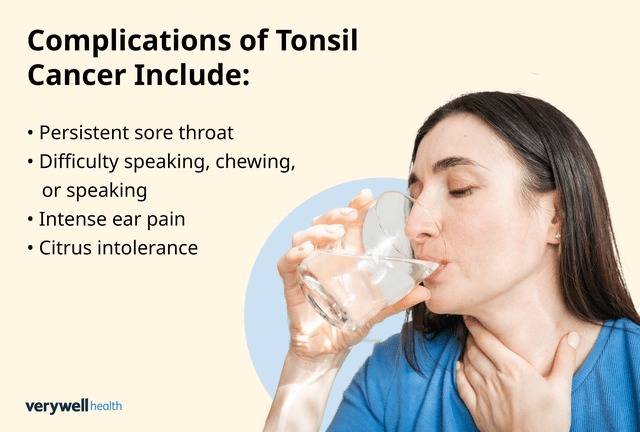How Tonsil Cancer Symptoms Progress
Medically reviewed by Doru Paul, MDMedically reviewed by Doru Paul, MD
Tonsillar cancer (or tonsil cancer) is a type of oropharyngeal (throat) cancer. Symptoms of tonsil cancer originate in the back of the throat and can include a lump on the neck, persistent sore throat, earaches, swallowing issues, or a feeling of something stuck in your throat (globus sensation).
This article discusses the signs of early-stage tonsil cancer, what it looks like and how it feels, and when to see a provider.

Photo composite by Tara Anand for Verywell Health; Getty Images
Frequent Symptoms of Tonsil Cancer
Early-stage tonsil cancer symptoms may include:
A feeling of blockage or having something stuck in your throat
A hoarse voice
Mouth pain
Pain when swallowing
Blood mixed in with saliva
Lump in the neck (usually painless, not tender to the touch)
Enlarged lymph node in neck
One tonsil larger than other
Persistent sore throat
Jaw pain
Ear pain
Tonsil pain or irritation in the back of your throat can be caused by many conditions other than cancer, such as tonsil stones or an infection that may cause enlarged lymph nodes and mimic cancer symptoms.
Can You Get Tonsil Cancer If You Had Your Tonsils Out?
Even if you've had a tonsillectomy to remove your tonsils, if any tonsillar lymphoid tissue remains, you can get tonsil cancer.
HPV Can Cause Tonsil Cancer
Tonsils consist of lymphoid tissue that can harbor cancer-causing strains of the human papillomavirus (HPV), such as HPV type 16. It is estimated that about 56% to 70% of tonsil cancer is associated with HPV infection.
Although HPV infection increases tonsil cancer risk, getting the HPV vaccine at a younger age can lower your lifetime risk of HPV-related cancers.
Serious Tonsil Cancer Symptoms
Like other types of throat cancer, tonsil cancer symptoms are the most serious when they cause difficulty breathing or the coughing up of blood. Other serious tonsil cancer symptoms may involve not being able to swallow solid foods and difficulty drinking liquids to the point that a feeding tube is required.
4 Stages of Tonsil Cancer
As with other throat cancers, tonsil cancer symptom progression is categorized on a 0 to 4 scale, as follows:
Stage 0: Known as carcinoma in situ, in this stage, precancerous cells show cancer potential but aren't cancerous yet and remain in their original place.
Stage I: The tumor is smaller than 4 centimeters (cm) and may have spread spread to one or more of the lymph nodes on the same side of the tumor none larger than 6 cm.
Stage II: The tumor may be larger than 4 cm in greatest dimension or may extend to lingual surface of epiglottis and there are contralateral or bilateral lymph nodes, none larger than 6 cm.
Stage III: Tumor may be any size and there is one or more lymph node(s) larger than 6 cm or tumor invades the larynx, extrinsic muscle of tongue, medial pterygoid (elevator of jaw muscle, hard palate, or mandible or beyond with or without involvement of lymph nodes.
Stage IV: In the most advanced stage of tonsil cancer, the cancer has metastasized (spread) to nearby tissue or distant areas like the lungs.
Comorbidities and Overlapping Conditions
If you smoke cigarettes, use smokeless tobacco ("dip"), or drink alcoholic beverages, you are more likely to experience complications and comorbidities (co-occurring conditions) of tonsil cancer. Not using smokeless tobacco products, quitting smoking, and drinking less alcohol may help your prognosis.
Your healthcare provider will conduct follow-up testing to make sure that tonsil cancer has not spread to other areas of the ears, nose, or throat.
When to Have an ENT Consult
If any of your ear, nose, or throat symptoms are persistent, don’t respond to antibiotics, or last longer than two weeks, speak to a healthcare provider about getting referred to an ear, nose, and throat (ENT) specialist, known as an otolaryngologist.
The fear and anxiety of living without an accurate diagnosis when you believe there's something wrong can be psychologically draining. If you've been experiencing any symptoms associated with tonsil cancer, advocate for yourself and insist upon having an ENT consultation as soon as it's possible.
Symptoms After Tonsil Surgery
If you need radiation therapy in addition to surgery, recovery symptoms may last even longer. For example, radiation-related alterations to taste function can last for six to 12 months after radiotherapy is completed.
Recovering from tonsil surgery may take up to two weeks. Common symptoms after tonsil surgery include:
Bad breath
White scabs (typically disappear after five to 10 days)
Pain
Fatigue
Ear pain
Summary
Common early signs of tonsil cancer, such as a persistent sore throat or a small, painless lump on the neck, may not be concerning at first.
However, if symptoms persist or if they worsen, including having difficulty breathing or coughing up blood, and you have suspicions something is wrong, make an appointment with your healthcare provider for a consultation and evaluation. Early diagnosis and treatment will lead to a better outcome.
Read the original article on Verywell Health.

